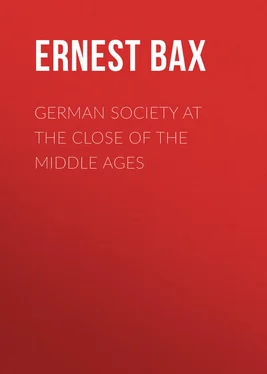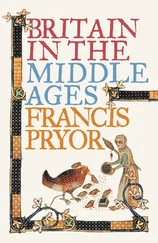Ernest Bax - German Society at the Close of the Middle Ages
Здесь есть возможность читать онлайн «Ernest Bax - German Society at the Close of the Middle Ages» — ознакомительный отрывок электронной книги совершенно бесплатно, а после прочтения отрывка купить полную версию. В некоторых случаях можно слушать аудио, скачать через торрент в формате fb2 и присутствует краткое содержание. Жанр: foreign_antique, foreign_prose, на английском языке. Описание произведения, (предисловие) а так же отзывы посетителей доступны на портале библиотеки ЛибКат.
- Название:German Society at the Close of the Middle Ages
- Автор:
- Жанр:
- Год:неизвестен
- ISBN:нет данных
- Рейтинг книги:5 / 5. Голосов: 1
-
Избранное:Добавить в избранное
- Отзывы:
-
Ваша оценка:
- 100
- 1
- 2
- 3
- 4
- 5
German Society at the Close of the Middle Ages: краткое содержание, описание и аннотация
Предлагаем к чтению аннотацию, описание, краткое содержание или предисловие (зависит от того, что написал сам автор книги «German Society at the Close of the Middle Ages»). Если вы не нашли необходимую информацию о книге — напишите в комментариях, мы постараемся отыскать её.
German Society at the Close of the Middle Ages — читать онлайн ознакомительный отрывок
Ниже представлен текст книги, разбитый по страницам. Система сохранения места последней прочитанной страницы, позволяет с удобством читать онлайн бесплатно книгу «German Society at the Close of the Middle Ages», без необходимости каждый раз заново искать на чём Вы остановились. Поставьте закладку, и сможете в любой момент перейти на страницу, на которой закончили чтение.
Интервал:
Закладка:
The Humanistic movement, so called, the movement, that is, of revived classical scholarship, had already begun in Germany before what may be termed the sturm und drang of the Renaissance proper. Foremost among the exponents of this older Humanism, which dates from the middle of the fifteenth century, were Nicholas of Cusa and his disciples, Rudolph Agricola, Alexander Hegius and Jacob Wimpheling. But the new Humanism and the new Renaissance movement generally throughout Northern Europe centred chiefly in two personalities, Johannes Reuchlin and Desiderius Erasmus. Reuchlin was the founder of the new Hebrew learning, which up till then had been exclusively confined to the synagogue. It was he who unlocked the mysteries of the Kabbala to the Gentile world. But though it is for his introduction of Hebrew study that Reuchlin is best known to posterity, yet his services in the diffusion and popularisation of classical culture were enormous. The dispute of Reuchlin with the ecclesiastical authorities at Cologne excited literary Germany from end to end. It was the first general skirmish of the new and the old spirit in Central and Northern Europe. But the man who was destined to become the personification of the Humanist movement, as the new learning was called, was Erasmus. The illegitimate son of the daughter of a Rotterdam burgher, he early became famous on account of his erudition, in spite of the adverse circumstances of his youth. Like all the scholars of his time, he passed rapidly from one country to another, settling finally in Basel, then at the height of its reputation as a literary and typographical centre. The whole intellectual movement of the time centres round Erasmus, as is particularly noticeable in the career of Ulrich von Hutten, dealt with in the course of this history. As instances of the classicism of the period, we may note the uniform change of the patronymic into the classical equivalent, or some classicism supposed to be the equivalent. Thus the name Erasmus itself was a classicism of his father's name Gerhard, the German name Muth became Mutianus, Trittheim became Trithemius, Schwarzerd became Melanchthon, and so on.
We have spoken of the other side of the intellectual movement of the period. This other side showed itself in mystical attempts at reducing nature to law in the light of the traditional problems which had been set, to wit, those of alchemy and astrology: the discovery of the philosopher's stone, of the transmutation of metals, of the elixir of life, and of the correspondences between the planets and terrestrial bodies. Among the most prominent exponents of these investigations may be mentioned Philippe von Hohenheim or Paracelsus, and Cornelius Agrippa of Nettesheim, in Germany, Nostradamus, in France, and Cardanus, in Italy. These men represented a tendency which was pursued by thousands in the learned world. It was a tendency which had the honour of being the last in history to embody itself in a distinct mythical cycle. "Doctor Faustus" may probably have had a historical germ; but in any case "Doctor Faustus," as known to legend and to literature, is merely a personification of the practical side of the new learning. The minds of men were waking up to interest in nature. There was one man, Copernicus, who, at least partially, struck through the traditionary atmosphere in which nature was enveloped, and to his insight we owe the foundation of astronomical science; but otherwise the whole intellectual atmosphere was charged with occult views. In fact, the learned world of the sixteenth century would have found itself quite at home in the pretensions and fancies of our fin de siècle theosophists, with their notions of making miracles non-miraculous, of reducing the marvellous to being merely the result of penetration on the part of certain seers and investigators of the secret powers of nature. Every wonder-worker was received with open arms by learned and unlearned alike. The possibility of producing that which was out of the ordinary range of natural occurrences was not seriously doubted by any. Spells and enchantments, conjurations, calculations of nativities, were matters earnestly investigated at universities and courts. There were, of course, persons who were eager to detect impostors: and amongst them some of the most zealous votaries of the occult arts – for example, Trittheim and the learned Humanist, Conrad Muth or Mutianus, both of whom professed to have regarded Faust as a fraud. But this did not imply any disbelief in the possibility of the alleged pretensions. In the Faust-myth is embodied, moreover, the opposition between the new learning on its physical side and the old religious faith. The theory that the investigation of the mysteries of nature had in it something sinister and diabolical which had been latent throughout the Middle Ages was brought into especial prominence by the new religious movements. The popular feeling that the line between natural magic and the black art was somewhat doubtful, that the one had a tendency to shade off into the other, now received fresh stimulus. The notion of compacts with the devil was a familiar one, and that it should be resorted to for the purpose of acquiring an acquaintance with hidden lore and magical powers seemed quite natural.
It will have already been seen from what we have said that the religious revolt was largely economical in its causes. The intense hatred, common alike to the smaller nobility, the burghers and the peasants, of the ecclesiastical hierarchy, was obviously due to its ever-increasing exactions. The sudden increase in the sale of indulgences, like the proverbial last straw, broke down the whole system; but any other incident might have served the purpose equally well. The prince-prelates were, in some instances, at the outset, not averse to the movement; they would not have been indisposed to have converted their territories into secular fiefs of the Empire. It was only after this hope had been abandoned that they definitely took sides with the Papal authority.
The opening of the sixteenth century thus presents to us mediæval society, social, political and religious, "run to seed". The feudal organisation was outwardly intact; the peasant, free and bond, formed the foundation; above him came the knighthood or inferior nobility; parallel with them was the Ehrbarkeit of the less important towns, holding from mediate lordship; above these towns came the free cities, which held immediately from the Empire, organised into three bodies, a governing Council in which the Ehrbarkeit usually predominated, where they did not entirely compose it, a Common Council composed of the masters of the various guilds, and the General Council of the free citizens. Those journeymen, whose condition was fixed from their being outside the guild-organisations, usually had guilds of their own. Above the free cities in the social pyramid stood the Princes of the Empire, lay and ecclesiastic, with the Electoral College, or the seven Electoral Princes, forming their head. These constituted the feudal "estates" of the Empire. Then came the King of the Romans; and, as the apex of the whole, the Pope in one function and the Emperor in another crowned the edifice. The supremacy, not merely of the Pope, but of the complementary temporal head of the mediæval polity, the Emperor, was acknowledged in a shadowy way, even in countries such as France and England, which had no direct connection with the Empire. For, as the spiritual power was also temporal, so the temporal political power had, like everything else in the Middle Ages, a quasi-religious significance.
The minds of men in speculative matters, in theology, in philosophy, and in jurisprudence, were outgrowing the old doctrines, at least in their old forms. In theology the notion of salvation by the faith of the individual, and not through the fact of belonging to a corporate organisation, which was the mediæval conception, was latent in the minds of multitudes of religious persons before expression was given to it by Luther. The aversion to scholasticism, bred by the revived knowledge of the older Greek philosophies in the original, produced a curious amalgam; but scholastic habits of thought were still dominant through it all. The new theories of nature amounted to little more than old superstitions, systematised and reduced to rule, though here and there the later physical science, based on observation and experiment, peeped through. In jurisprudence the epoch is marked by the final conquest of the Roman civil law in its spirit, where not in its forms, over the old customs, pre-feudal and feudal. This motley world of decayed knights, lavish princes, oppressed and rebellious peasants, turbulent townsmen, licentious monks and friars, mendicant scholars and hireling soldiers, is the world some of whose least-known aspects we are about to consider in the following pages.
Читать дальшеИнтервал:
Закладка:
Похожие книги на «German Society at the Close of the Middle Ages»
Представляем Вашему вниманию похожие книги на «German Society at the Close of the Middle Ages» списком для выбора. Мы отобрали схожую по названию и смыслу литературу в надежде предоставить читателям больше вариантов отыскать новые, интересные, ещё непрочитанные произведения.
Обсуждение, отзывы о книге «German Society at the Close of the Middle Ages» и просто собственные мнения читателей. Оставьте ваши комментарии, напишите, что Вы думаете о произведении, его смысле или главных героях. Укажите что конкретно понравилось, а что нет, и почему Вы так считаете.










